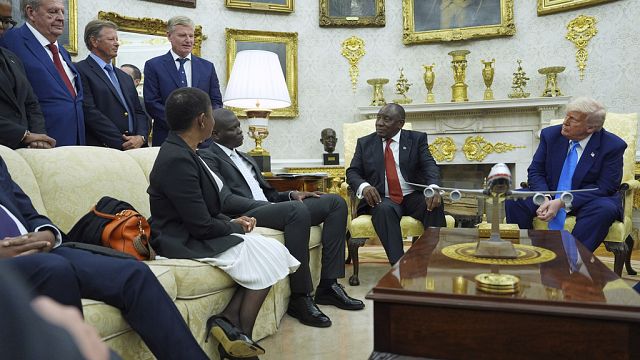In a recent revelation, South Africa’s Police Minister Senzo Mchunu vehemently refuted U.S. President Donald Trump’s claims of genocide during a meeting with President Cyril Ramaphosa. Trump’s assertion was centered around a video clip he presented during the Oval Office meeting, where he pointed to white crosses along a roadside, which he believed were a memorial for white farmers who had been killed. However, Mchunu clarified that these crosses were not marking graves but were actually a temporary display set up in 2020 to protest farm killings across South Africa.
The Minister explained that the crosses were erected during a funeral procession for a white couple who tragically lost their lives in a farm robbery. He emphasized that Trump’s narrative of genocide in South Africa, particularly targeting white farmers, was entirely unfounded. Mchunu expressed his disappointment at the misrepresentation, labeling it as part of Trump’s fabricated “genocide story” that alleges a systematic campaign in South Africa to murder white farmers and seize their land, a claim that lacks any basis in reality.
Mchunu’s response underscores the importance of distinguishing fact from fiction, especially in matters as sensitive as allegations of genocide. The Minister’s clarification not only aimed to debunk Trump’s misleading interpretation but also sought to uphold the truth and integrity of the situation in South Africa. By addressing Trump’s erroneous portrayal, Mchunu defended the reputation of his country and its people against baseless accusations that could potentially harm diplomatic relations and sow discord.
The incident sheds light on the power dynamics in international discourse and the implications of spreading misinformation at the highest levels of leadership. It underscores the need for responsible and accurate communication, particularly when discussing complex and contentious issues such as land ownership and security in South Africa. Mchunu’s firm stance against Trump’s misrepresentation serves as a reminder of the importance of verifying sources and ensuring that statements are grounded in reality rather than sensationalism.
As the debate continues over the narrative surrounding land reform and farm attacks in South Africa, Mchunu’s rebuttal to Trump’s claims sets a precedent for challenging misleading assertions and defending the truth. It also highlights the resilience and integrity of South Africa’s leadership in the face of external scrutiny and misinformation. By standing up against false accusations, Mchunu exemplifies a commitment to transparency and accuracy in public discourse, setting a standard for accountable governance and international relations.
In conclusion, the clash between Trump’s allegations and Mchunu’s response unveils a broader narrative of credibility and integrity in the realm of global politics. It underscores the importance of fact-checking and critical thinking in evaluating claims made by influential figures, emphasizing the need to uphold truth and accuracy in the face of misinformation. Mchunu’s unwavering stance against the distorted portrayal of events in South Africa serves as a testament to the country’s commitment to honesty and accountability, even in the face of unfounded accusations.









Leave feedback about this